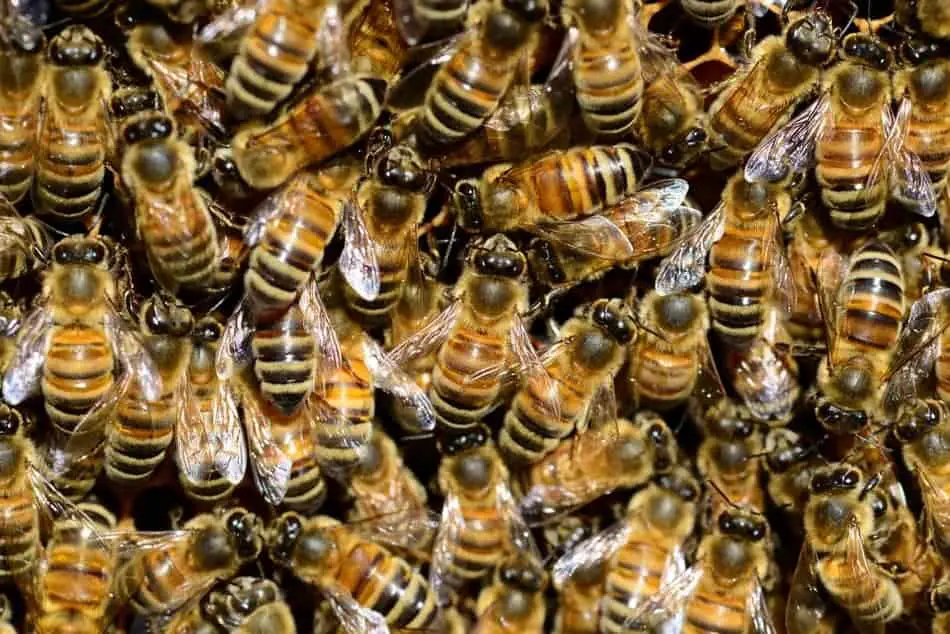
Last summer I was in my back yard playing with the kids, and I saw some bees hanging around my gas grill. They eventually flew away, but from then I always wondered if bees nested in barbecues, and if they did how to get them out. So I did a little research.
So how do you get bees out of the barbecue? If the barbecue invaders are bees, get a professional apiary to remove them. If your invaders are wasps, gear up with some insecticide and smoke them out!
Bees and wasps do nest in grills, especially if they haven’t been used in a while. How you deal with them depends on what kind of flying invader you have. We’ll take a closer look.
How Do I Get Rid of Bees in my Barbecue?
First, if they are a bee colony, you don’t want to damage the bees. Bees have been on the decline for several years now – habitat loss, pesticides, diseases and invasive species have all been taking their tolls on the bee population and it’s having an impact on crops, plants, and flowers – even in your own back yard. About a third of the food we eat relies on pollinating insects and if we continue to lose bees at the rate we’re seeing, we could see serious impacts in our food production. So if you have honey bees in your BBQ, make sure you take care of them by calling a professional to remove the hive and transport it somewhere it will be both safe and helpful.
The first step in removing a colony of bees is to look up a local beekeeper or apiary (which is a fancy word for beekeeper) and have them come to look at and/or remove the hive. While you may see a charge for this kind of work, you may also get it for free (or you may be able to sell the hive to the beekeeper – the beekeeper might get a new hive out of the visit. Make sure you talk about it with them.)
To get the colony out the beekeeper will first give it a thorough examination – figure out the size and health of the colony, and if there is a queen present. They will then smoke the bees (which doesn’t hurt them at all, it just keeps them calm) and remove the various combs from the hive. New combs may not be salvageable, but more establish ones can be put into wooden box bee hives. A little more smoke and perhaps some gentle shaking, and most of the bees should move to their new home. The new hive can then be transported to it’s permanent location away from people – and away from your grill!
How Do I Get Rid of Wasps in my Barbecue?
Wasps are a completely different story from bees. Wasps (or yellowjackets) are an aggressive species that don’t build honeycombs or produce honey but do build nests that can get very large – and they do build them in enclosed spaces like barbecues. Wasps are an annoyance and while they can pollinate they are much less efficient at it, and are much more destructive to people. They are in general pests and you should have no issues in destroying a wasp nest.
Before we start – wasps can be dangerous. Wasps don’t lose their stingers like bees do, and so can sting you multiple times. If you do get stung many times, even if not allergic, the venom could cause some danger. If you are allergic to wasp stings, just stay away and call an exterminator. A large wasp nest could contain thousands of wasps, so make sure you’re careful. If you do get attacked by wasps, move away quickly in a straight line without swatting or swinging your arm, and get rid of any food or drink you’re holding.
If you’re still interested in getting rid of wasps, let’s continue. To reduce any risk with the wasps, make sure you take any of these steps after dark when the wasps will be less active and they will all have returned to the nest. If you clear a nest during the day the wasps are away and could still be a nuisance.
The easiest way to get rid of a wasp nest that is both small and in the grill box of your BBQ might be to just light the grill and let it cook for an hour. The heat will kill the wasps and burn up the nest (which is almost like a paper) and get rid of the problem.
If the nest is larger, or not contained in the grill box, then insecticide of some kind will be required. If the nest is still small it could be contained in a large container of some kind (like a coffee can) and moved somewhere away from the barbecue before dousing with insecticide. This would help keep the grill cleaner and reduce the work you need to do after the invaders are dead. If the nest is larger and you can’t move it, you can kill it in place and then clean the grill after.
What Insecticides Would I Use On A Wasp Nest?
There are a couple of options for insecticides – a spray and an aerosol bomb.
An insecticide spray (also called a knockdown spray) kills wasps on contact. To use it on a nest you need a clear shot at the nest from a distance – some of these sprays can shoot 20 feet. Simply soak the nest in the insecticide spray and it will kill both the wasps and the larvae in the nest. Give the spray an hour to work and then come back and remove the nest and any wasp remains.
An aerosol bomb would be used if the nest is contained in a space that can keep a fog in such as under an un-ventilated cover, or in the enclosed barbecue base. An aerosol bomb would release all the insecticide contained in it at once and create a fog in the area that would kill the wasps. The bomb will need several hours to work, so move away quickly after detonating it and leave it overnight to work. In the morning the area can be cleaned and the dead nest removed. If your grill can be covered with a large plastic bag, it would help keep the fog in and make the wasps dead.
How Do I Tell the Difference Between Bees and Wasps?
Bees and wasps do look fairly similar. The easiest way to tell them apart when looking at them is that bees have fine hairs on them that help collect and distribute pollen, while wasps do not.
When looking at colonies or nests, bees build waxy combs where they store their honey, while wasps build papery dome-shaped or football shaped structures that hold their larvae. Bees are pollen gatherers, while wasps are pure predators.
How Do I Clean the Barbecue After Removing Bees or Wasps?
Cleaning a grill after a bee or wasp infestation is similar in both cases, but you have to be extra careful with it if you’ve used pesticides in your grill. To clean your BBQ after getting rid of colony or nest:
- Remove the grills from the grillbox and clean with hot soapy water and a wire brush. Get the entire surface of the grill clean. Rinse thoroughly then set the grills aside and allow to dry. If you used insecticide, follow the same steps with any heat spreaders.
- If you used insecticide, Use soapy water to clean the inside of your firebox and all the open surfaces of your barbecue. Wipe down/rinse with clean water as appropriate. Allow to dry.
- Replace all grill components and light the barbecue. Turn the BBQ up to the highest acceptable sustained heat (based on your manual) and let it run for an hour to cook off any left over pieces of honeycomb, nest, or insect corpse
How Do I keep Bees and Wasps Away From the BBQ in the Future?
The best way to keep bees and wasps away from your grill is to use it frequently. If they don’t have time to set up a home in your grill, they won’t be able to nest there.
If you can’t use the grill frequently, make sure that it’s clean, that you turn the propane off and burn off the excess in the hoses after use (as it can attract wasps) and inspect it frequently.
Related Questions
How do I keep bees or wasps away when cooking on the BBQ? Bees are probably not much of an issue, but wasps are attracted to food and can be a pain. Try a paper wasp nest or a wasp trap baited with vinegar, sugar, and salt.
What are some natural ways to keep bees away? One suggestion is to put out some essential oils. Peppermint, citronella, cedarwood, eucalyptus are all supposed to be bee repellent.

